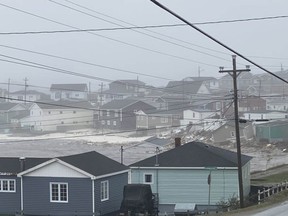Fiona has flooded streets, ripped homes from their foundation, toppled phone polls, and destroyed part of a sewer system. RCMP have also started investigating reports that someone has washed out to sea

PORT AUX BASQUES, NL – “Our town is being destroyed.”
My cousin, who has opened her home to us, is crying in her kitchen. She is making tea and talking about whose homes are gone. She can name them and so can I. These are our friends, our neighbours. The ones whose homes have not yet been washed away are perched precariously on rocks and will not last much longer.
Sign up to receive the daily top stories from the National Post, a division of Postmedia Network Inc.
Thanks for signing up!
A welcome email is on its way. If you don't see it, please check your junk folder.
The next issue of NP Posted will soon be in your inbox.
She’s not exaggerating. Fiona has flooded streets, ripped homes from their foundation, toppled phone polls, and destroyed part of a sewer system. RCMP have also started investigating reports that someone has washed out to sea
To reach our cousin’s house in Mouse Island we had to re-route because the low lying streets are closed. We are on another hill, this one a bit closer to the sea but with a higher rock face. There is a house floating in the water.
-

Fiona knocks out power with strong winds in Atlantic Canada
-

Hurricane Fiona will be 'a storm to remember,' with severe impact on Atlantic provinces expected: experts
One of my relatives had lost her house. First responders have been screaming truck sirens and going door to door for hours and she was among the first evacuated.
Down in East End where I live, our house is on a hill 2 blocks away from the water. We were ordered to evacuate because if we don’t, we will be cut off from the rest of the town. I hope my two-storey victorian will be standing when it’s all over, but the winds drown out phones, televisions, your own thoughts, and everything but the sirens.
We lost water pressure when the surge caused a manhole to explode. Somehow the power crews are climbing poles, keeping the power going. To a spectator they look mad, swaying in their buckets. The poles are swaying and there are some power losses. A photo I took of a blue house about to slip into the water still had power, even as its windows were blown out.
If you’re unfamiliar with our geography, the town is basically surrounded by water on three sides and backed by the Long Range Mountains.
Evacuating is not exactly easy here. To leave the town entirely means taking the Trans Canada Highway through the Wreckhouse. Even without these storms, Wreckhouse winds can and regularly do topple transport trailers. But now is not the time to go sight seeing or even try to cross the causeway leading out of town.
On Facebook, Mayor Brian Button is still in the process of declaring a state of emergency. He’s stopped sugar coating and the stress is evident in his voice, on his face.
“It’s becoming unsafe for our crews,” says Button. “We do not need people out cruising around taking pictures.”
He doesn’t want people going back to their homes to grab anything.
“You don’t need it.”
We didn’t expect to be evacuated, but we were prepared.
The first thing I grabbed was my dog. He was hiding and he’s still shaking, a 23 pound terrier mix. He’s in an unfamiliar environment and he can feel my stress and smell the fear that is coming off of his humans. The second thing was my go bag. I’ve got a cup of tea and I’m sitting too close to the window but I need to keep electronics charged, if for no other reason than I might have to call 911.
There are boats floating in front of homes at a park. The Town Hall is flooded. There are houses floating in the coves. This is debris flying around, hitting everything. Walking to the car, even weighed down by bags and a dog, requires significant effort.
“Oh me nerves,” says my cousin as she answers the phone.
It rings incessantly. So does mine, but for a few minutes at least I’ve stopped answering calls. I need a moment to catch my breath and just stare out into Fiona’s fury.
My Francophone relatives keep reaching out from Quebec. In New Brunswick, Nova Scotia and across Canada and the USA my friends and family keep reaching out. I am safe. My family is safe. Others are not so lucky.
My brother, who edits our local newspaper, is getting calls from relatives to assist. He is a trained volunteer firefighter, albeit on leave due to eye surgery. He’s still helping where he can, arranging medical transport and communicating with first responders. Neighbours are trying to help. It is the Newfoundland way.
I have seen my share of storms. You don’t live by the ocean and not weather your share of some whoppers. I’ve been through the Wreckhouse when trucks have rolled over. Strong winds are just another Saturday around here.
But I have never seen anything even close to Hurricane Fiona before.
—
Rosalyn Roy is the Senior Staff Reporter for the Wreckhouse Weekly News


